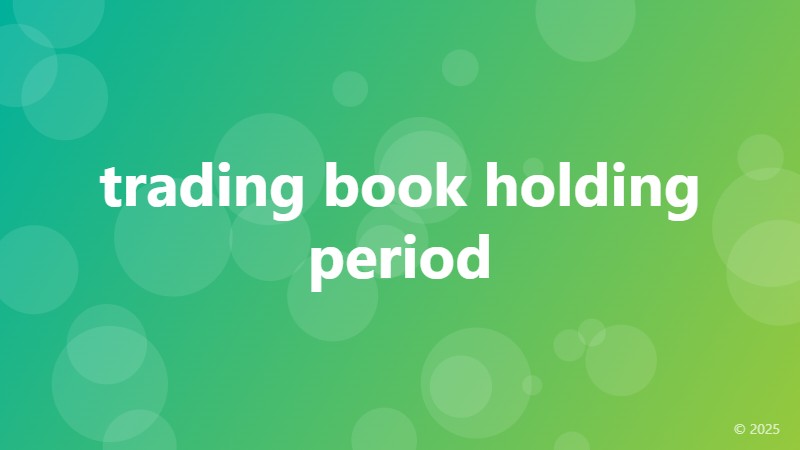trading book holding period

Understanding Trading Book Holding Period: A Key to Successful Investing
When it comes to trading, one of the most critical aspects to consider is the holding period of your trading book. The holding period refers to the length of time you hold onto a particular security or investment in your portfolio. It's a crucial factor that can significantly impact your returns, risk management, and overall trading strategy. In this article, we'll delve into the importance of trading book holding period and how it can affect your investment decisions.
The Impact of Holding Period on Trading Returns
The holding period of your trading book has a direct impact on your returns. A shorter holding period typically results in higher transaction costs, as you'll be buying and selling securities more frequently. This can erode your returns, especially if you're trading in low-liquidity markets or with high-frequency trading strategies. On the other hand, a longer holding period can lead to lower transaction costs, but it also means you'll be exposed to market volatility for an extended period.
For example, let's say you're a day trader who holds onto a stock for only a few hours. You'll likely incur higher transaction costs due to the frequent buying and selling. In contrast, a long-term investor who holds onto a stock for several years will have lower transaction costs, but they'll also be exposed to market fluctuations for a longer period.
Risk Management and Holding Period
The holding period of your trading book also plays a critical role in risk management. A shorter holding period can help you minimize losses by quickly exiting a losing trade. However, it can also lead to over-trading, which can result in a higher risk of losses. A longer holding period, on the other hand, can help you ride out market fluctuations, but it can also mean holding onto a losing trade for an extended period.
It's essential to strike a balance between risk management and holding period. A trading book with a mix of short-term and long-term holdings can help you manage risk while also providing opportunities for growth.
Factors Affecting Holding Period
Several factors can influence the holding period of your trading book, including:
- Market conditions: Volatile markets may require shorter holding periods, while stable markets can accommodate longer holding periods.
- Trading strategy: Different trading strategies, such as day trading or swing trading, require varying holding periods.
- Risk tolerance: Your risk tolerance will influence the length of time you're willing to hold onto a particular security.
- Investment goals: Your investment goals, such as long-term growth or short-term income, will also impact your holding period.
By considering these factors, you can determine the optimal holding period for your trading book and make informed investment decisions.
Conclusion
In conclusion, the holding period of your trading book is a critical aspect of successful investing. It can impact your returns, risk management, and overall trading strategy. By understanding the factors that influence holding period and striking a balance between risk management and return, you can optimize your trading book and achieve your investment goals.